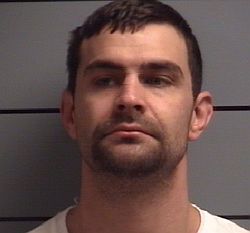October 16, 2013
 10/17/13 Judge Robert O. Bowen sentenced Travis Chizum to the maximum amount of time allowed by law for the offense of manufacturing methamphetamine, possession of methamphetamine, possession of precursors with intent to manufacture methamphetamine, and maintaining a common nuisance. A count of conspiracy to manufacture methamphetamine was ruled by Bowen to merge into the count of manufacturing methamphetamine. Bowen gave the maximum sentence on the manufacturing charge of 20 years. He imposed maximum sentences on the other counts of three years each. The sentences were ordered to be served concurrently making the total sentence of imprisonment of 20 years.
10/17/13 Judge Robert O. Bowen sentenced Travis Chizum to the maximum amount of time allowed by law for the offense of manufacturing methamphetamine, possession of methamphetamine, possession of precursors with intent to manufacture methamphetamine, and maintaining a common nuisance. A count of conspiracy to manufacture methamphetamine was ruled by Bowen to merge into the count of manufacturing methamphetamine. Bowen gave the maximum sentence on the manufacturing charge of 20 years. He imposed maximum sentences on the other counts of three years each. The sentences were ordered to be served concurrently making the total sentence of imprisonment of 20 years.
A Marshall County jury deliberated a little over an hour on September 25 after hearing two days of testimony and viewing over a hundred exhibits. Chief Deputy Prosecuting Attorney Nelson Chipman argued for the maximum sentence allowed based upon Chizum’s six prior felony convictions and numerous prior motions to revoke probation. “The defendant has proven with his prior record and failed opportunities at rehabilitation, that he needs to be removed from society for as long as the law allows,” Chipman emphasized. South Bend attorney Gary Griner argued on Chizum’s behalf for a lesser sentence.
The case started when officer John Weir of the Plymouth Police Department traveled down an alley in the 1000 block of N. Plum St. in January of 2013 and smelled a powerful chemical and ammonia odor coming from a garage structure. Weir knew from experience and training the smell is commonly associated with the manufacture of methamphetamine. He began an investigation that included surveillance of the building he suspected was the source of the smell. That surveillance lasted over a month as he watched numerous persons with known criminal and drug related backgrounds frequent the premises. His investigation identified the owner of the building and that Travis Chizum was the occupant. Then a final tip came when an individual who was being arrested for paraphernalia offered to show where he purchased methamphetamine and it was the same building. Weir drafted a search warrant that was approved by a judge and a raid was conducted on March 7, 2013 by Plymouth Police Officers, with assistance from the Indiana State Police and Marshall County Police.
Arrested at the scene on March 7 was Adam Wagers of Grovertown, Dianna Watson of Syracuse, and Kimberlie Frazier and Jordan Bunton both of Plymouth. Wagers has since plead guilty to manufacturing methamphetamine and received a 14 year sentence with 4 years suspended. It soon became clear to investigators that Watson, Bunton and Frazier had just arrived at the premises just prior to the police. Watson has since plead guilty to possession of methamphetamine and visiting a common nuisance. Bunton has plead guilty and received a sentence of time served Watson and Bunton testified at the trial that Travis Chizum had left only minutes before the police arrived with the search warrant. It was their testimony that proved crucial in linking Chizum to the manufacturing operation.
Frazier failed to appear at the trial after having been served with a subpoena. A warrant for her arrest was previously issued in an unrelated case and remains outstanding.
The Indiana State Police Clandestine Team was called upon to assess the site and inventory the meth production related items. Trooper Keith Bikowski identified meth related items in over 100 photographic exhibits shown the jury by Prosecutor Chipman. Three exhibits analyzed by the State Police Laboratory to contain methamphetamine were also entered into evidence, along with the logs documenting the individuals’ pseudoephedrine purchasing history in pharmacies in Plymouth, Knox, South Bend, Valparaiso, Rochester and Iowa. Pseudoephedrine is an essential ingredient for the manufacture of methamphetamine. It was explained that the national computer based log is what people sign when purchasing over the counter cold medicine that contains pseudoephedrine.
Indiana State Police Trooper Brandon McBrier explained to the jury with a Power Point presentation the intricacies of manufacturing methamphetamine. Officer Weir testified to the events leading up to the search warrant and its execution and the arrest of the four individuals. He also testified to the interviews he conducted with the various individuals. Trooper Bikowski then identified the photographs and told the jury they found an active lab producing methamphetamine at the time of the raid, 16 used and discarded one pot labs, and 23 HcL generators that are part of the end process.
Bikowski also testified that some of the one pots were unusually large. One such lab was created out of a garden variety fertilizer or bug spray container, over a gallon in size, and cleverly equipped with a toilet valve designed to release pressure as the meth ingredients cooked.
Marshall County Police Officer Jonathon Bryant testified how he apprehended Adam Wagers as Wagers tried to escape from the rear window of the structure. Bryant also found meth soaked coffee filters in Wagers’ pocket. Plymouth Police Corporal Bridget Hite testified how she found a bag of meth in the bra of Dianna Watson, and how the items were packaged and transported to the State Police Lab for analysis. Hite also provided the jury with the laboratory results.